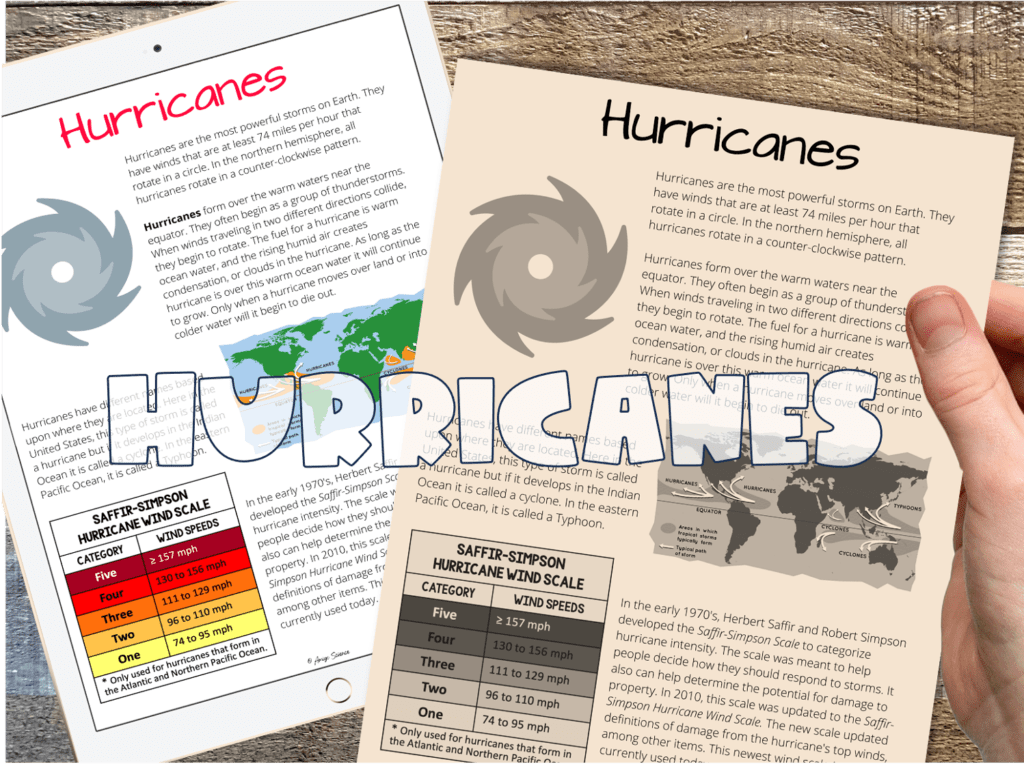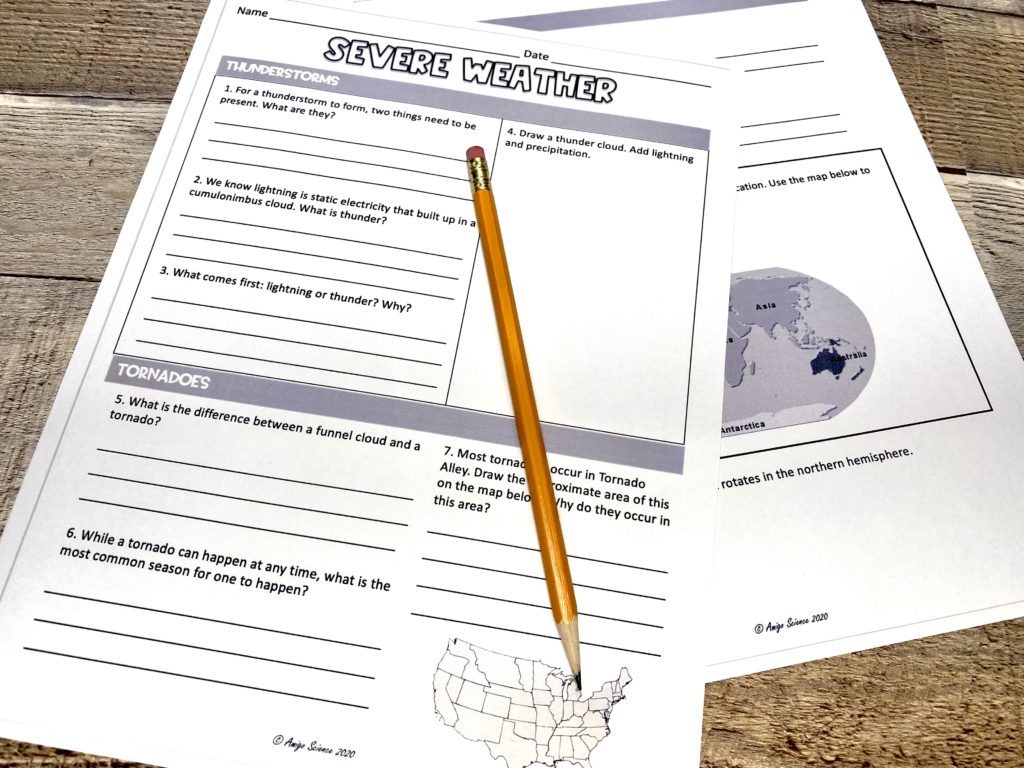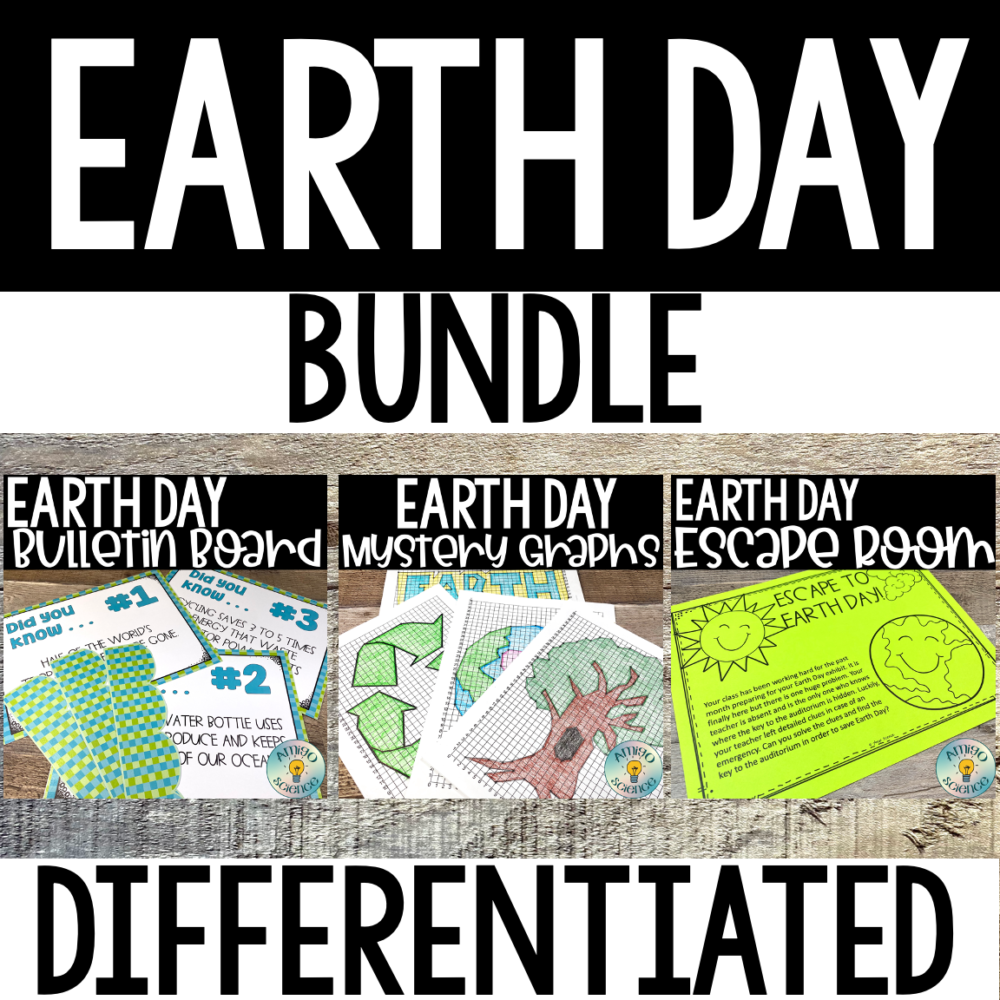Inside this Article
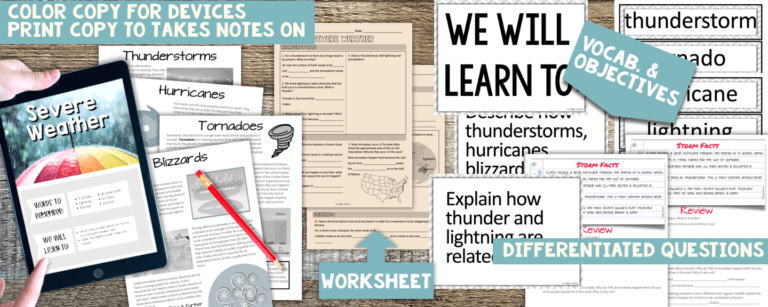
The diagram above shows some of the items used in this severe weather lesson plan. They include:
- color digital resource for devices
- printable resource
- severe weather worksheet
- severe weather objectives to post on the board
- severe weather vocabulary for word wall
- differentiated review questions
Severe Weather Lesson Plan: Hurricanes
The picture on the right shows the severe weather lesson page I use when introducing hurricanes. It includes the updated version of the Saffir-Simpson Hurricane Wind Scale for students to study.
This resource also shows a map of where these tropical storms have different names. They learn that storms in the Atlantic and western Pacific are considered hurricanes, while the same storms in the Indian Ocean are called Cyclones. Finally, storms that occur in the eastern Pacific Ocean are referred to as typhoons.

I’m a middle school Science teacher and TPT author. My goal is to share useful resources to make your life easier.
Do you want science freebies, tips and survival techniques? To start you out, you will receive a HUGE planets lesson!
A Good Time to Study Hurricanes is During Hurricane Season
Even if you aren’t currently teaching about severe weather, don’t pass up a great learning opportunity for your students! Here are some quick activities you can do to help students learn about these incredible storms during a hurricane.
- Find the path or “track” the hurricane will take. First, provide students with a map of the U.S. and have then draw the path. Students can predict which states will be affected or if the storm will veer off course.
- Predict when the storm will build up to a hurricane or be downgraded to a tropical storm or depression. Discuss why storms get weaker when they reach land.
- Have students pick a state that was affected by the storm. They can create a weather report for that state and present it to the class as a meteorologist.
- Students can research how storms are named. Find out the next two or three names of future storms.
Severe Weather Lesson Plan: Thunderstorms
Oftentimes, my sixth graders don’t know what thunder is. I play this up by asking what they know about thunder. I always tell them what I heard as a kid – God bowling, angels moving furniture, etc. Then, I ask for the tales they have heard about what thunder is. Many explain thunder as clouds bumping together, and other funny explanations that make us laugh.
Finally, I reveal to them that thunder and lightning are actually one and the same and I’m not going to lie – it pretty much blows their minds. I then explain that thunder is the sound lightning makes. We discuss this at length, and talk about being able to hear a little static electricity shock. This is just a smaller version of of lightning. Next, we discuss the difference between a close sound of thunder (crack!) and a far away sound (roll). This is because sound is slower than light and it takes a while to reach us.
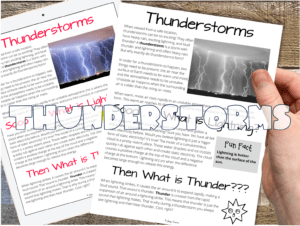
Severe Weather Lesson Plan: Tornadoes
At this point, I like to have my students draw a thunderstorm scene. They illustrate the cumulonimbus clouds, and add thunder and lightning and illustrate what is happening. In this severe weather lesson, we read about how the cumulonimbus cloud is a violent place that creates static electricity. In their drawings, they draw the positive and negative charges, along with the lightning strikes and the “boom” of the thunder!
We are often spared from the experience of tornadoes in our part of the world. Unfortunately, that doesn’t mean we have never had one. In fact, a tornado devastated an area less than an hour from our school district. But, these weather events are definitely rare.
Students are always eager to learn about the circumstances that need to happen for a tornado to occur. They are amazed that more tornadoes happen in the U.S. than in any other part of the world!
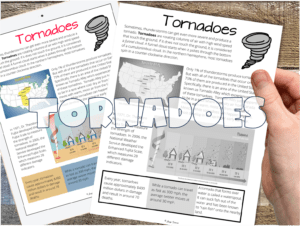
We use this lesson to sum up our discussion about tornadoes and to discuss the Fujita Scale. Similar to the Saffir-Simpson Scale, the Fujita Scale was recently updated. Currently, the new scale is called the Enhanced Fujita Scale. It measures 28 different damage indicators of a tornado.
Finally, students are encouraged to compare and contrast the Saffir-Simpson Hurricane Wind Scale with the Enhanced Fujita Scale.
Tip: Continue your tornado discussion by asking your students how engineers build houses that are able to withstand the destructive force of a tornado. What would it look like? Find a YouTube video showing the destruction of a tornado. How could they build a house that survived? What would it have to be built out of?
Finish With an Extreme Weather Worksheet FREEBIE
In order to reinforce these three types of extreme weather, I use this worksheet as shown on the right. It hits the three topics previously discussed: hurricanes, tornadoes and thunderstorms.
Supplement with This Website
Visit Scijinks.gov with your students. This site shows live pictures of extreme weather that you can show to your students.

The Ultimate & Complete Clouds Lesson Plan is Here
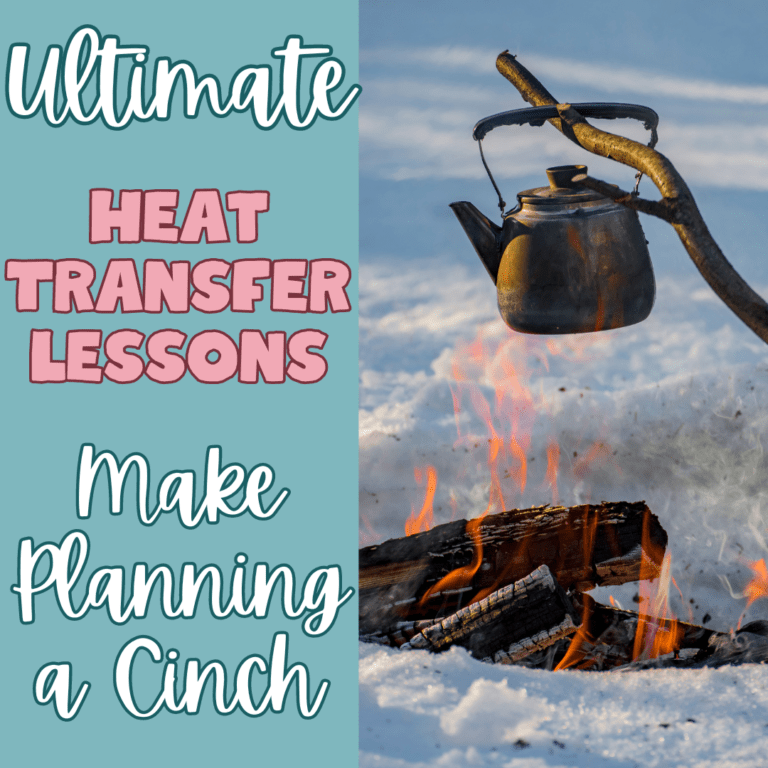
Using Heat Transfer Stations in Your Classroom
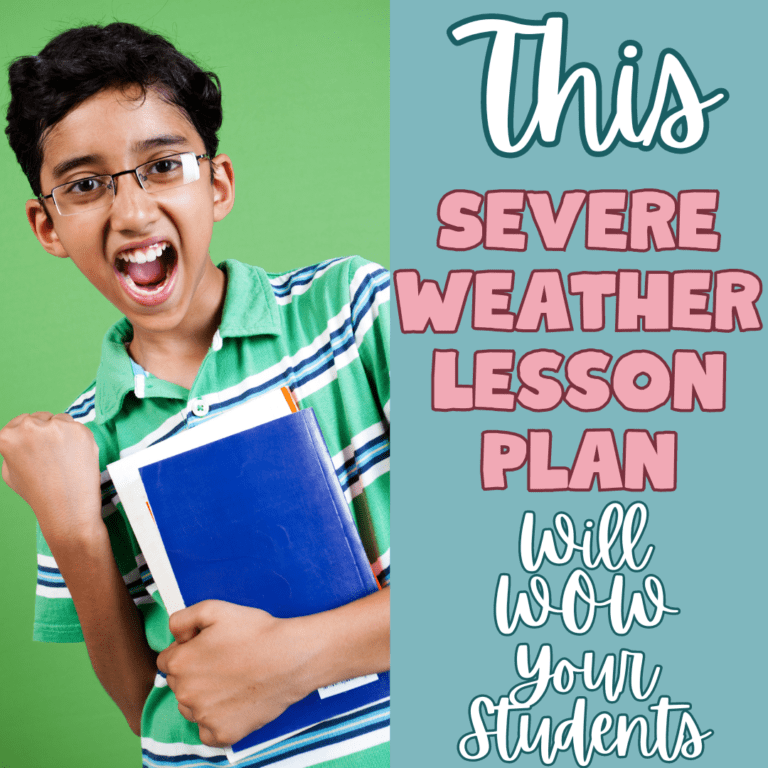
This Severe Weather Lesson Plan Will Wow Your Students!
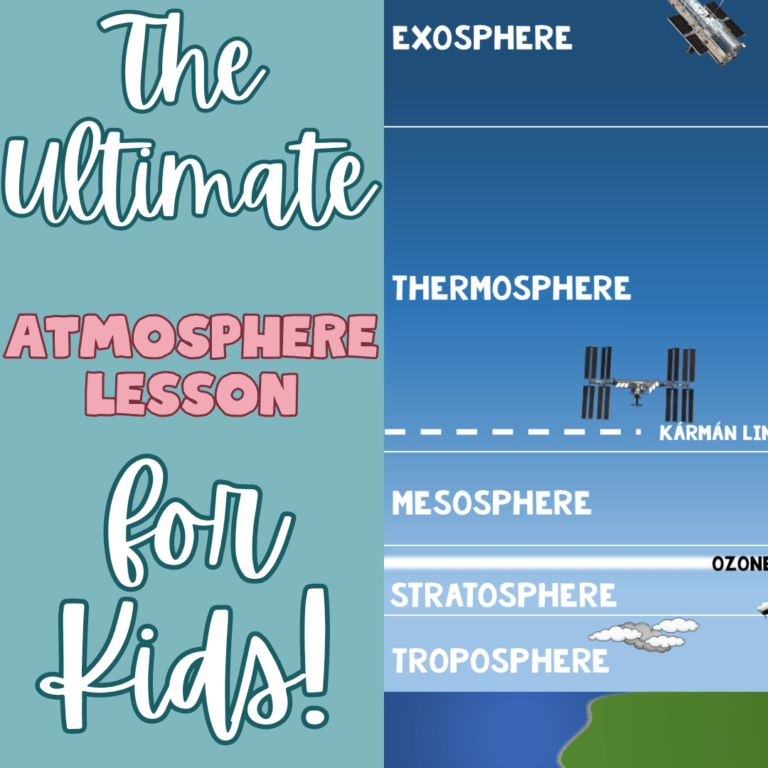
Ultimate Layers of the Atmosphere Lesson for Kids!
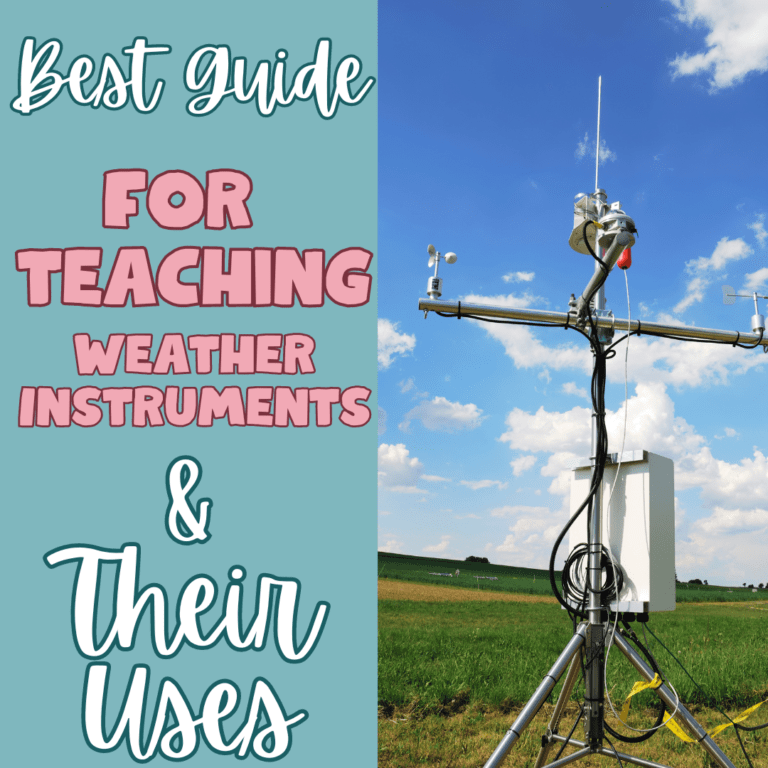
Best Guide for Teaching Weather Instruments and Their Uses
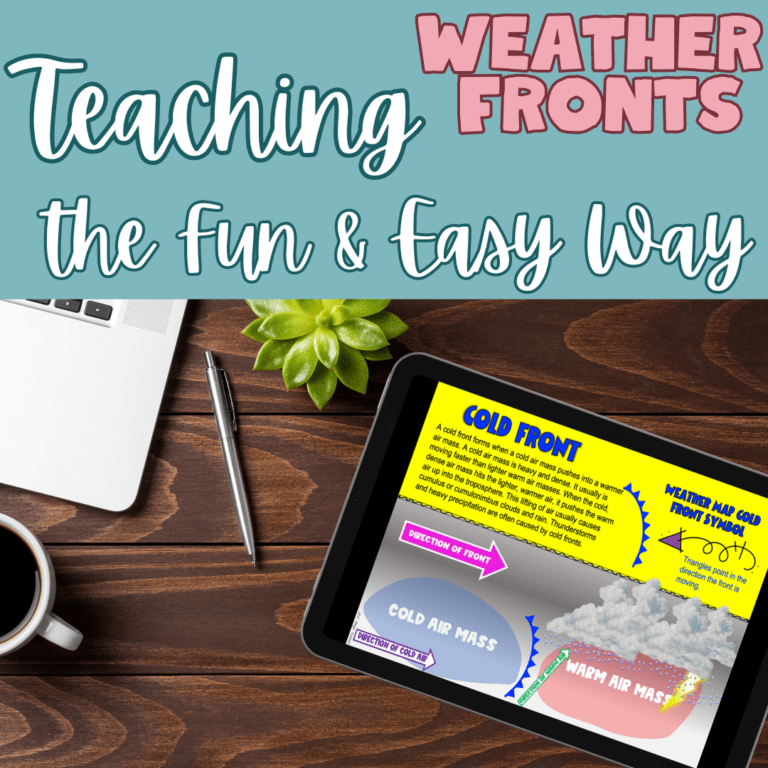
Teaching Weather Fronts the Fun and Easy Way
Types of Clouds Activity
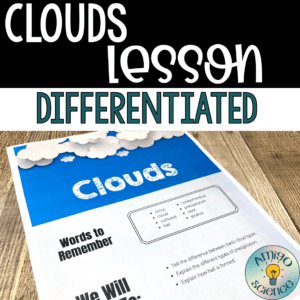
Need a low-prep, complete clouds lesson about cloud formation and cloud types? This is it! Students will learn how clouds are formed through the water cycle, along with the two types of cloud classification – shape and altitude. Also included are the different types of precipitation in a cloud: rain, snow, sleet, freezing rain, and hail. Differentiated comprehension questions, TWO differentiated worksheets, word wall words, objectives for the board, printable cloud pictures for teacher AND student, lesson and answer key make this resource a no-brainer. It’s all here for you. All you have to do it print, laminate and USE!
$7.00
Layers of the Atmosphere Review Board Game for Middle School
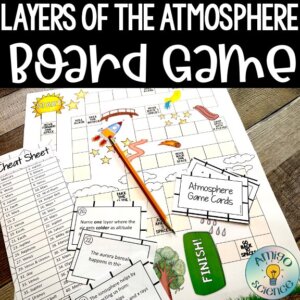
Do you want a fresh new activity to amplify your layers of the atmosphere lesson? Try this Earth’s atmosphere review activity board game! Students who are studying the layers of Earth’s atmosphere as part of their weather unit will love this self-checking game.
Keep reading for more information about this resource!
$4.75
Air Masses & Weather Fronts Lesson Bundle
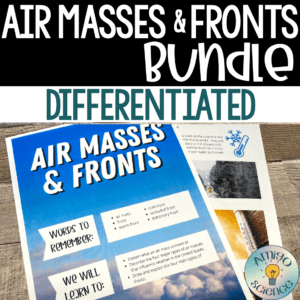
Teachers, looking for an easy, no-prep lesson? This Air Masses and Weather Fronts Lesson Bundle is for you! Students to learn how warm and cold air masses interact. These interactions create a warm front, cold front, stationary front or occluded front. This bundle includes two formats: a digital and print reading lesson, as well as a full-color digital drag and drop activity. Students use clipart to make their own fronts!
$8.32
Air Masses and Fronts Lesson
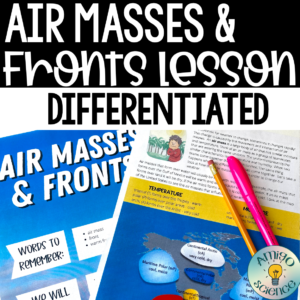
Unleash the mysteries of weather patterns with our dynamic Air Masses & Weather Fronts Lesson! This comprehensive resource offers a captivating exploration of atmospheric phenomena, perfect for both digital and print formats. Whether you’re teaching in a virtual or traditional classroom, this versatile lesson empowers your students with a deeper understanding of air masses, weather fronts, and their impact on our ever-changing weather.
Keep reading for more information about this resource!
$5.25
Conduction Convection Radiation BOOM Cards
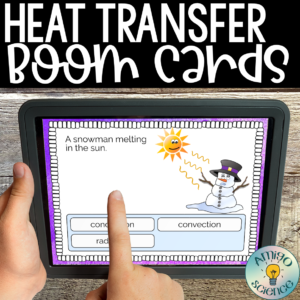
Keep reading for more information about this resource!
$2.50
Digital Air Masses and Fronts Lesson
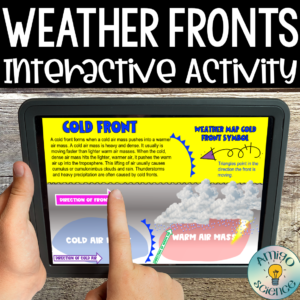
Easy to use digital air masses and fronts lesson. Perfect for using any device such an iPad, SmartBoard, phone or laptop. Can be used for guided instruction or as individual work. After learning about the weather fronts, students will have an opportunity to create their own fronts right on their devices! Moveable clipart is able to be resized as well as copied and pasted. Let your students get creative and create their own weather fronts!
Make sure to watch the video for more information!
$4.00

